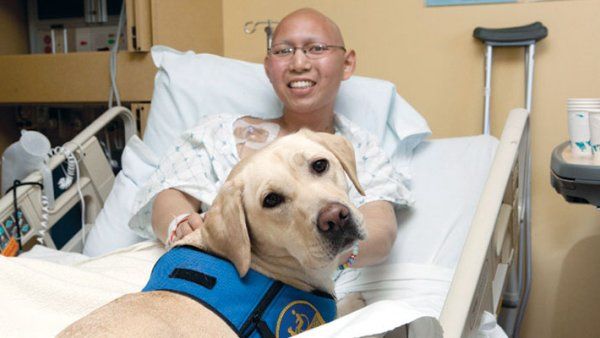Remembering Nilani
UCSF’s beloved service dog was a miracle worker, a sweetheart, a healer, a friend.

University of California San Francisco
Give to UCSFUCSF’s beloved service dog was a miracle worker, a sweetheart, a healer, a friend.

A team of researchers at UCSF has devised a new approach for early stage drug discovery that uses techniques from the world of computer vision in combination with a powerful new tool.

These are the stories that engaged our visitors in 2015 – whether it was reading in-depth about brain rejuvenation, watching mesmerizing cells in motion on social media, or learning about the latest discoveries that could soon lead to new treatments.

We asked experts across UCSF to identify what's ahead in how we approach research, what disease areas will see major advances, and where basic science will be translating into real treatments.

One year after UCSF students launched a national movement to highlight highlight racial disparities in education, health care and civic justice, they gathered again to meet a new challenge for the movement: turn words into actions.


See a collection that highlights 30 moments and milestones of 2015 that represent our missions in research, patient care and education.

The lineup is finalized for the 2016 Personalized Medicine World Conference, with nine scheduled talks by UCSF leaders and faculty.

The city offers its residents and the UCSF community an abundance of benefits, from its thriving culture of innovation to its surrounding natural beauty. Those benefits, however, have come at a cost – especially in recent years, as housing costs have skyrocketed and competition for affordable units has grown fierce.

UCSF and UC Hastings College of the Law have signed a Letter of Intent to jointly develop new campus housing in San Francisco’s Civic Center and Tenderloin neighborhoods, in an effort to serve the growing housing needs of their students and trainees.

The Cancer Center will give $250,000 to one high-risk, high-reward research project to address a key problem in cancer. Deadline for applications is Dec.18.

The Doris Duke Charitable Foundation has announced grants totaling $5.4 million to 10 medical schools, including UCSF, to provide stronger institutional support and supplemental funds for early-career physician scientists.

A new study by UCSF scientists shows that the proportion of normal cells, especially immune cells, intermixed with cancerous cells in a given tissue sample may significantly skew the results of genetic analyses and other tests performed both by researchers and by physicians selecting precision therapies.

A small study of new mothers suggests that not having graduated from high school may impact the likelihood of babies being born with shortened telomeres.

If depression is caused by flawed brain circuitry, it may be possible to shift that circuitry toward healthy neural processing instead. UCSF researchers hope to map and correct aberrant neural behavior to cure mood disorders.

As health care shifts away from a fee-for-service model as a result of the ACA, health care workers in California will be called upon to develop new skills and fill new roles, according to a study led by UCSF researchers.

To mark World AIDS Day, the government of Mexico City held a ribbon-cutting ceremony for a new HIV/AIDS clinic and named it for Jaime Sepulveda, MD, DSc, MPH, executive director of UCSF Global Health Sciences.

HIV can lurk for a lifetime in the body, so to truly cure patients, scientists are trying to find ways to target these HIV reservoirs in a strategy known as “shock and kill.”

UCSF's Global Health Sciences is launching a new project to improve care for women in India and Kenya, called the Strengthening People-centered Accessibility, Respect, and Quality (SPARQ) project, funded by the Bill and Melinda Gates Foundation and The David and Lucile Packard Foundation.

In a bid to end the worst epidemic in modern times, the Foundation for AIDS Research (amfAR) is funding an ambitious effort based in San Francisco to eliminate the human immunodeficiency virus (HIV) from those who are infected.

The Malaria Elimination Group, an independent international advisory group on malaria elimination convened by the Global Health Group at the University of California, San Francisco (UCSF), gathered in the Ezulwini Valley for its tenth meeting to celebrate Swaziland’s achievements. The meeting was opened on November 16, 2015 by Swaziland’s Minister of Health, Honorable Sibongile Ndlela-Simelane.

In the first U.S. safety trial of a new form of immunotherapy for type 1 diabetes, patients experienced no serious adverse reactions after receiving infusions of as many as 2.6 billion cells that had been specially selected to protect the body’s ability to produce insulin.

A new study led by UCSF researchers has found that mice who spend too much time in their thermal “comfort zone” while gorging on fatty foods more than double their risk of developing cardiovascular disease compared to mice who stayed cool while eating the same diet.

The annual staff appreciation events not only recognize the collective contributions of staff, but they also build on other UCSF initiatives designed to foster community.

Louis Ptacek and William Seeley have been selected as fellows of the American Association for the Advancement of Science, the world’s largest general scientific society.

In his new role as UCSF’s first vice chancellor for Science Policy and Strategy, Keith Yamamoto will lead efforts to position the University optimally by influencing and shaping science policy at the state and national levels.
